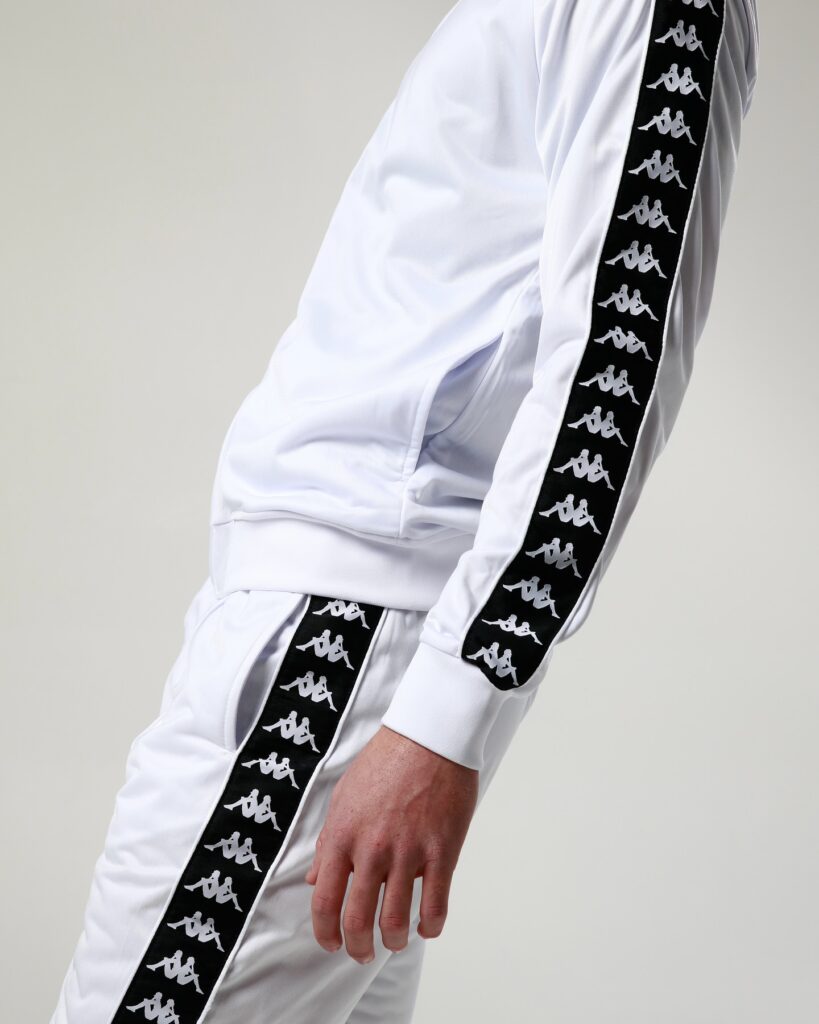Kappa: From Humble Beginnings to Global Sportswear Icon

Kappa: From Humble Beginnings to Global Sportswear Icon. In the bustling city of Turin, Italy, 1916 marked the inception of a modest sock and underwear company named Società Anonima Calzificio Torinese, founded by Abramo Vitale. This enterprise, rooted in quality craftsmanship, would eventually evolve into Kappa, a brand synonymous with innovation, resilience, and style in the sportswear industry.
Quality Assurance as a Catalyst for Growth
The mid-1950s presented a significant challenge when a manufacturing defect led to product recalls, threatening the company’s reputation. In response, the company implemented rigorous quality control measures and introduced the “K-Kontroll” stamp—a symbol of excellence that restored consumer trust and propelled the brand to the forefront of the Italian market.

The Birth of the Iconic ‘Omini’ Logo
A serendipitous moment during a 1960s swimwear photoshoot gave rise to the ‘Omini’ logo. Photographer Sergio Druetto captured the silhouette of a man and woman sitting back-to-back, symbolizing mutual support. This emblem became the visual cornerstone of Kappa’s identity, embodying the brand’s commitment to unity and collaboration.
Pioneering Sports Sponsorships
Kappa’s strategic foray into sports sponsorship began in 1979 with a landmark partnership with Juventus FC, marking the first such deal in Italian football history. This collaboration not only elevated Kappa’s profile but also set a precedent for future alliances. The brand’s presence expanded globally through outfitting the USA Track and Field team in the 1984 and 1988 Olympics, showcasing the versatility and appeal of Kappa’s designs on an international stage.

Innovating with Kombat 2000
In 2000, Kappa revolutionized football apparel with the introduction of the Kombat 2000 jersey for the Italian national team. Utilizing elastomeric fabrics, this skin-tight design enhanced player performance and challenged conventional notions of sports uniforms, reinforcing Kappa’s reputation as an innovator.
Navigating Cultural Perceptions
The early 2000s brought unforeseen challenges when the brand became associated with the “chav” subculture in the UK, notably through the character Vicky Pollard in the television show “Little Britain.” This portrayal negatively impacted sales, illustrating the profound effect of media on brand perception. However, endorsements from figures like Brooklyn Beckham helped rehabilitate Kappa’s image, demonstrating the power of influential partnerships in brand recovery.

Diversification and Modern Collaborations
Kappa’s resilience is evident in its strategic diversification into various sports, including rugby and winter sports, and its embrace of contemporary collaborations. Partnerships with fashion entities like Palace Skateboards have bridged the gap between sportswear and streetwear, appealing to a new generation and revitalizing the brand’s relevance.
Lessons for Aspiring Entrepreneurs
- Commit to Quality: Implementing stringent quality controls can transform potential setbacks into opportunities for building consumer trust.
- Embrace Serendipity: Unexpected moments can lead to iconic branding elements; remain open to inspiration from all sources.
- Forge Strategic Partnerships: Aligning with prominent organizations and events can significantly enhance brand visibility and credibility.
- Innovate Continuously: Investing in research and development to create groundbreaking products can set a brand apart in a competitive market.
- Adapt to Cultural Shifts: Stay attuned to cultural trends and perceptions, and be prepared to pivot strategies to maintain a positive brand image.
Kappa’s journey from a small Italian sock manufacturer to a global sportswear powerhouse exemplifies the importance of authenticity, strategic marketing, resilience, and growth. For entrepreneurs, Kappa serves as a testament to the power of innovation and adaptability in building a lasting brand legacy.


